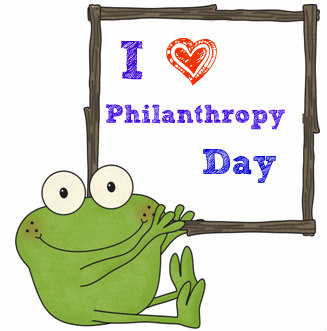It doesn't matter if you're a donor or a volunteer, or which causes you support; it doesn't matter if you're young or old. What matters today is that we all find a way to make a difference. The word philanthropy comes from the Latin and Greek word philanthropia which gives us kindliness, humanity, and love to mankind. Philo means "tending to or fond of" while anthropos means mankind or human beings. But giving, either of time or resources, doesn't just benefit the receiver or receiving organization. Giving has a HUGE impact on the giver, too.
1. Giving makes us feel happy. A study done at Harvard Business School found that giving money to others raises our spirits more than if we kept it and spent it on ourselves. The same holds true for those who perform random acts of kindness. Those good feelings are reflected in our biology. Scientists have shown that altruistic behavior releases endorphins in the brain that give us that "warm glow" feeling, also referred to as "helper's high."
2. Giving is good for our health. There have been many studies done that link generosity to better health. One study showed that elderly people who volunteered at two or more organizations were 44% less likely to die over a five-year period, than those who didn't volunteer, even after controlling for their age, exercise habits, general health, and negative habits, like smoking. One theory suggests that this is because volunteering reduces stress and lowers blood pressure.
3. Giving promotes cooperation and social connections. When you give, you're more likely to give back. This promotes a sense of trust and cooperation that strengthens ties to others. “The more extensive the reciprocal altruism born of social connection . . . the greater the advance toward health, wealth, and happiness," write researcher John Cacioppo. Additionally, when we give to others, not only do they feel closer to us, but we also feel closer to them. It's a big win-win for everyone.
4. Giving evokes gratitude. Research shows it doesn't matter if you're on the giving or receiving end of the gift that matters; giving elicits feelings of gratitude in both participants. Gratitude is integral for happiness, health, and social bonds. Teaching children to 'count their blessings' is a lesson that will serve them well throughout their lifetime. And did you know that gratitude can make you feel more optimistic, help you to exercise more, and generally feel better about your life? It can. And all while doing good for others!
And I like this last one the best.
5. Giving is contagious. When we donate resources, or give of ourselves in some way, we don't just have an impact on the immediate recipient. Rather, it actually has a ripple effect that will run through the community. How many times have you heard, or read, about someone who did something wonderful for your community and you thought to yourself, "Gee, that's great...maybe I can do something similar." It spurred you on to volunteer, or give, yourself. I have this happen to me every holiday season. We all need reminders, from time to time, and these heart-warming stories can go along way in bringing attention to the people and causes that you value most. But giving should just happen at Christmastime. The need is there 365 days a year...and so is the opportunity to give.
With the holiday season right around the corner, perhaps today is the day to offer up your volunteer services at a favorite charity or cause. Or, plan to donate a large portion of your holiday bonus check to someone in need. As Anne Frank once said, "No one has ever become poor by giving." We all have SOMETHING we can give. Sometimes it's big...sometimes it's small. The size is never what's important.
Today, November 15th, is Philanthropy Day. Why not spend some time looking for items around your house that you can donate to one of the many charitable organizations in your community; old towels and blankets can be used by animal shelters and clothing is always welcomed by the homeless. Or write a check to a charity instead of spending the money on going out with friends to dinner and a movie.
The act of giving needn't be big. The smallest acts are often the ones that come full circle and blossom in the most beautiful and unexpected ways.

 RSS Feed
RSS Feed